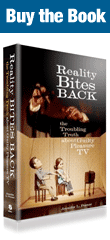As a long-time media critic, I can tell you that
this is not a sentence I’m accustomed to writing: Corporate media gave me a huge gift yesterday.
As I traveled to Denver (to moderate a panel and have a wine and cheese reception for my book at the Women’s Studies Association conference), Newsweek’s Jessica Bennett reviewed Reality Bites Back in a lively feature headlined, “Everything I Learned About Women I Learned From Reality TV.” Her subhead that says it all: “Which means I must think they’re all desperate, competitive, plastic-surgery-obsessed bimbos. The problem? Today’s reality entertainment is a lot more like fiction.”
I couldn’t be happier with Benett’s take on the book and the issue of representation of women in this genre throughout the last decade. She writes:
If your main source of knowledge about women came from reality TV, this is how you’d see the world: a place where your mom is a conniving, deceitful gold digger, your sisters and girlfriends vicious and catty. You would learn that “sisterhood†is a thing of the past, as Pozner puts it—and that girl friendships are not powerful but spiteful. And you’d understand that women were put on this earth to compete for male attention—when, of course, they’re not busy pulling each other’s hair out or lounging half naked in a hot tub.
It’s worth a laugh, except that the implications of that imagery can be serious, as even the trashiest, most scripted reality show can influence how we see the world. Pozner, a journalist and media critic, has devoted much of the last decade to watching, transcribing, and dissecting hour after hour of reality programming, from the desperate waifs on America’s Next Top Model to the gold diggers competing for a washed-up rap star on Flavor of Love. (Transcribing that one, she jokes, was a “particular kind of hell.â€) Yet while these shows’ portrayal of men is nothing to write home about, what Pozner concludes is that their portrayal of women doesn’t just reflect outdated stereotypes—it resurrects them. “With few exceptions, [these] shows have framed women as unaware that there is anything more to life than tossing back martinis, lounging in hot tubs, and as Bachelorette Christine suggested, meeting their husbands at the door with dinner and a foot rub ready,†writes Pozner. “I think it’s hard to have this be part of your fundamental years and not have it influence you.â€
And, as a cherry on top, Newsweek also gave me the opportunity to write a companion piece to the review — a slideshow “listicle” of “Reality TV’s 9 Worst Stock Characters” (which I based on the premise behind the satirical book trailer and webisode series, “Reality Rehab with Dr. Jenn“). There’s a paragraph describing each of the worst of reality TV’s gender and racial biases via stock characters including:
- The Desperate Bachelorette
- The Despicable Dude
- The Slut (and Her Nemesis, The Good Girl)
- The Bitch
- The Angry Black Woman
- The Beauty-Obsessed Waif
- The “Real” Housewife
- The Gangsta Guy
- The Pathetic Plastic Surgery Patient
I’ll write a separate post about my Newsweek piece if time permits on the book tour, but for now, go read the companion piece, leave comments, and send letters to the editor thanking Newsweek for running this slideshow, as well as Bennett’s review. It’s rare that corporate media outlets devote serious attention to feminist media analysis and, even more rare, that they come out on the side of media literacy. I think that deserves some positive reinforcement via letters to the editor, eh?
And because I’m so pleased to see a major corporate news outlet delve into this analysis of gender and race in reality TV, here’s another snippet of Bennett’s article:
…In the real world, the state of today’s women actually looks something like the opposite. Women in 2010 make up the majority of the workforce for the first time. They are waiting longer to get married, and their husbands are taking on more responsibility at home. But that doesn’t make for good reality TV, of course—especially when 75 percent of creators, executive producers, directors, and writers on the majority of these shows are men. So instead, women are cast to fill specific, sculpted roles that are morphed and manipulated by producers. Which is why the year that Condoleezza Rice is named national-security adviser (in 2000), we end up with Who Wants to Marry a Multi-Millionaire? on Fox; or that in 2003, as Michelle Kwan and Serena Williams scored record-breaking sports wins, UPN decided to unveil America’s Next Top Model. Last year, as the median age of a woman’s first marriage rose to an all-time high, VH1 premiered Tough Love, whose host begins each episode by saying, “Nobody knows single women like I do. They’re lonely. They’re clueless. They’re needy.†We could go on, but you get the point: so-called reality programs don’t actually jibe with reality…






